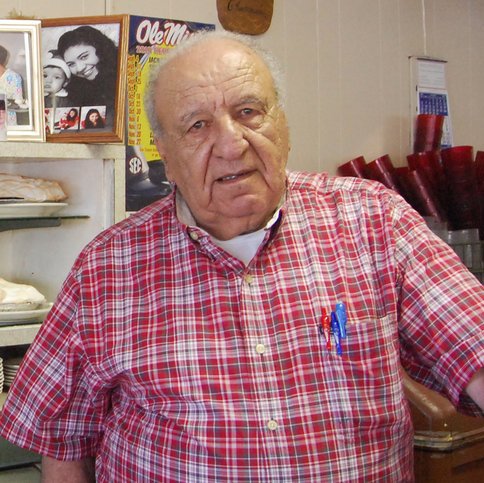Mississippians

Photo by Amy Evans
Chafik A. Chamoun was born in 1932 to Abraham and Nazha Gattas Chamoun in Zahlé, Lebanon, in the Bekaa Valley. His grandfather Joe Gattis had come to America through Mexico around 1900, first living in and peddling around Brookhaven, Mississippi, and later settling in Clarksdale.
Until he was twenty-two, Chamoun had lived in Zahlé, where he and his family farmed wheat, corn, and watermelon and owned a vineyard, but in 1954 he and his wife, Louise, then seventeen, immigrated through New York Harbor to America—traveling down to Mississippi, where he still had family. Neither Chafik nor Louise spoke fluent English, but he soon found work as a “Rawleigh Man,” selling household products door to door in the rural parts of Coahoma County for the W. T. Rawleigh Company. He did so for nineteen years.
In 1968 Chafik and Louise purchased a grocery store that they named Chamoun’s Grocery, where after some time, in order to complete with growing competition from supermarkets, he and Louise began selling lunches and sandwiches, including kibbee sandwiches.
In 1990 an opportunity arose for them to purchase Rest Haven, an American, Italian, and Lebanese restaurant that had been in the Joseph family—another local Lebanese family—for many years. In the tradition of Chamoun’s Grocery, Chafik and Louise included an expanding list of Lebanese food on the Rest Haven menu, including kibbee (raw, baked, and fried), cabbage rolls, grape leaves, tabouli, and pita bread. They returned to visit their former homeland about once a year until the September 11 attacks on the US in 2001.
Their daughter Paula took over the management of Rest Haven when her father was no longer able to manage the day-to-day operations of the restaurant. She continues to run Rest Haven today.
Chafik Chamoun passed away on December 8, 2017, and Louise Chamoun passed away on September 12, 2019.
My interview with Chafik Chamoun took place at Chamoun’s Rest Haven Restaurant in Clarksdale, Mississippi, on April 6, 2007.
The following quotes are from the 2007 interview with Chafik Chamoun:
“My grandfather came in the late 1800s. He came to, they say, to Brookhaven. Then they came here [to Clarksdale]. [H]is brother came here, he brought his sisters here, so most of the Lebanese people here came from the Lebanese village I came from. Zahlé, in the valley. […] He came through Mexico. Then they came to Brookhaven, then from Brookhaven they come here.”
“In those days, the only way they could make a living— They couldn’t speak the language, and lots of country people live on the farm, so they used to sell them clothes, merchandise. All the Lebanese who came here were peddlers. They go probably about twenty-five, thirty miles, walk, and they spend the night in the black people’s homes. They ain’t got no vehicle, no donkey, no horse, nothing. They were tough. They put something on their back and they go from house to house. They sold clothes and socks and different things. And then when they get established they open up a grocery store. He open grocery store. He stay in the grocery for about forty years.”
“I tell you, I made my living from the black people. Let’s say I have a route, I was selling merchandise. Riley Products, or Watkin, you know. Like Avon products. But it was different, what people use on the farm like insecticide, carbon dust, roach killer, rat poison, vanilla-flavored perfume, deodorant, all that stuff. Then I started selling dry goods. I made living out of black people. It was special relationship between Lebanese and black community. […] And these black people they bought from the Lebanese people, the peddlers, they give them place to live, so no need for Lebanese people to resent them really. They were grateful to them. The people I was dealing with, doing business with, they were my friends. When I left the trade I missed them. They were poor, they didn’t have any money, but they never beat me. If they had a dollar or two they spent it, but I was honest with them too. We were raised with no prejudice. I’m the same, everyone like that, but the majority of the Lebanese people, we know what hard time is. When you know what hard time is, you feel for somebody having hard working time.”
“When the old generation come, they were resented at first. They didn’t speak the language, they didn’t know the way of life here, you know, it’s like some people look at the Mexicans now.”
“I’m going to tell you this, be honest with you. We’re losing our customs. I’ll tell you how we’re losing our customs. When I came here in 1954, one of my uncles was in process of divorce, and as far as my grandmother and grandfather, it was like a funeral. They took it very serious. Now, we’re no different from anybody else. You see more divorced people among the Lebanese people as much as Anglo-Saxon or Italian, Greek, whatever. So we’re really losing the belief and the heritage that we used to have. And our children, they are not, they are losing their roots. They mix them up with different cultures. And when you live in this country and you see this going on, they are no different. I mean, they are decent children and everything, but I think everybody’s losing the real value of the Lebanese culture. And that is true from the Italian to the Jewish to the Chinese. They are not holding on to their own culture better than anybody else. Little by little. Time’s changing, you know.”
—Chafik Chamoun
Video
The Rest Haven, originally titled "From Kibbie to Cornbread", a short film made in 2010 by Mississippi Arts Commission director Malcolm White and Alex Tufel in collaboration with Barefoot Workshops and Blue Magnolia Films. Used with permission.
